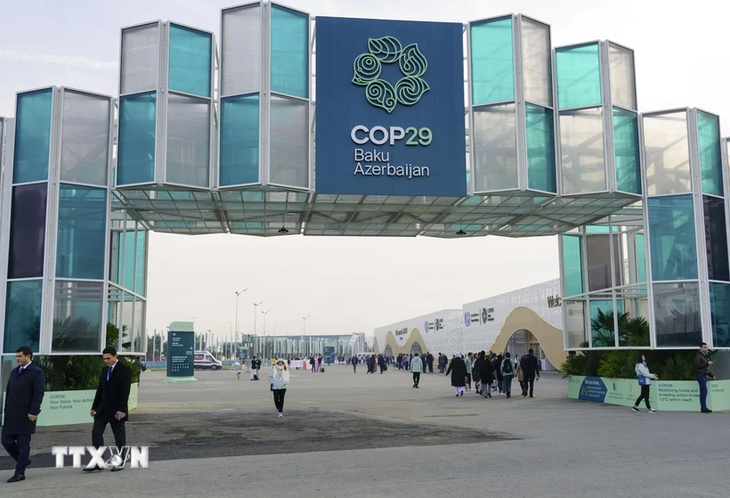(VOVWORLD) - After two weeks of intense negotiations in Baku, Azerbaijan, the 29th Conference of the Parties to the United Nations Framework Convention on Climate Change (COP29) concluded on Sunday with a new climate finance agreement that left a bitter taste for many developing countries.
 The COP29 venue in the capital Baku of Azerbaijan (Photo: Kyodo/ VNA) The COP29 venue in the capital Baku of Azerbaijan (Photo: Kyodo/ VNA) |
COP29 talks were extended two extra days in order to reach a climate finance deal that will pay 300 billion USD per year to developing nations by 2035.
Unambitious agreement
The overarching goal of COP29, known as the Climate Finance Summit, was to reach a new agreement on climate finance, called the “New Collective Quantitative Target” (NCQG). The new agreement will replace the commitment of 100 billion USD a year made by developed countries in 2009, which will expire at the end of this year.
COP29 participants engaged in a series of discussions before and during the Summit, and spent more than half of their time in Baku negotiating financial issues. At the last moment, developed countries agreed to raise their contribution from 200 billion USD to 300 billion USD per year, and promised to mobilize 1 trillion USD per year from other financial sources by 2035.
The deal of 300 billion USD per year was strongly opposed by many developing countries, saying it was insufficient compared to the actual need of trillions of dollars each year. Representatives of India, Nigeria, and Cuba called the 300-billion-dollar deal a joke and the promise of 1.3 trillion per year by 2035 an optical illusion.
At the final session on the night of November 23, the group of least developed countries and small island states even left the meeting room to protest the small amount and the reluctance of the developed countries.
Panama's special representative on climate change Juan Carlos Monterrey said, “We have been negotiating on the issue over three years. We’ve been in Baku for over three weeks. We have enough time to get to consensus. However developed countries always throw the figures at the last moment, and then for the sake of multilateralism, we always have to accept it and take it.”
To keep COP29 from ending in failure, the host country Azerbaijan lobbied countries to approve the agreement, saying that failure in Baku would be a serious setback in the fight against global climate change.
Simon Stiell, Executive Secretary of the United Nations Framework Convention on Climate Change (UNFCC), said the 300 billion dollar per year deal is not satisfactory but is temporary insurance against climate change.
“We needed this to be an enabling COP – one which helped translate the pledges of COP28 into real-world outcomes to protect people, prosperity, and the planet. At COP28 the world agreed to triple renewables. At COP29 we tripled climate finance, and countries will work to mobilize much, much more,” Stiell said.
Encouraging outcomes
COP29 made little progress on completely eliminating fossil fuels, a historic commitment made at COP28 last year in Dubai. Discussions on energy transition did not receive a push from the G20 countries. The simultaneous G20 Summit in Rio de Janeiro, Brazil, did not mention the elimination of fossil fuels in its Final Declaration. There was a concern that a lack of progress on energy transition would make emission reduction targets impossible.
At COP29, countries reached consensus on the operation of the carbon markets, cross-border trading, and carbon credit mechanisms. Despite protests from environmental groups and indigenous rights organizations, the adoption of any regulations at all on carbon markets was a remarkable step forward after many years of deadlocked negotiations.
Axel Michaelowa, Head of the International Climate Policy Research Group, University of Zurich, Switzerland, said, "International carbon markets have been a very contested subject so we talk now almost a decade since the Paris agreement to get all the rules in place. So it's a great day because it means we see a full operationalization of the international carbon markets and that would of course enable developing countries to generate revenues, so the generation of carbon credits."
COP29 addressed strengthening climate policy, identifying financing needs, and climate reporting transparency, and completed new reporting tools for the Enhanced Transparency Framework (ETF) of the Paris Agreement on Climate Change.
A program was created to support implementation of the National Adaptation Plans of less developed countries. COP29 amplified the voice of local communities and indigenous peoples in climate action, reaffirmed the importance of gender equality, and advocated integrating gender issues into climate policies. COP29 engaged children in the Youth-Led Climate Forum for the first time, highlighting the role of youth and children in climate action.